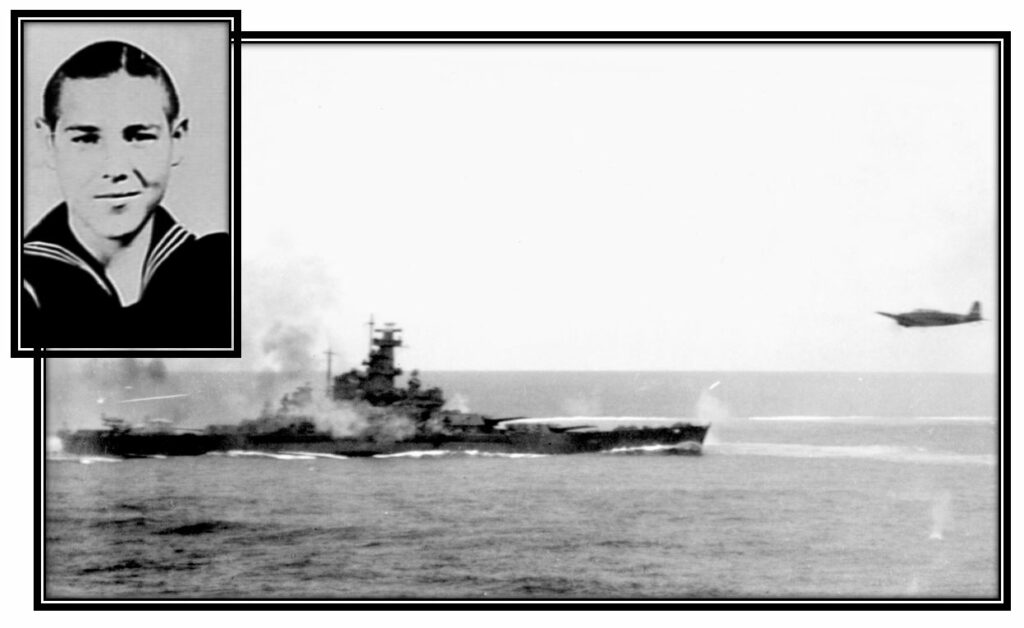
To listen to today’s reflection as a podcast, click here
It’s hard to overstate the eagerness of many underage men to join America’s armed forces in World War II.
Calvin Graham was one of them. In August 1942 he walked into a recruiting station in Fort Worth, Texas.
The recruiting officer had a pretty good idea Calvin was too young to go to war. The dentist who examined his teeth was certain that he wasn’t yet 18 years old.
But Graham was determined to serve his country.
While the dentist wasn’t looking, he quietly slipped his file from the stack of “rejected” recruits to the “approved” pile.
Within a few days he was in boot camp in San Diego. That fall he shipped out to the Pacific theater, where he became a gunner on the battleship South Dakota. During the Battle of Santa Cruz and the subsequent nighttime Battle of Guadalcanal, he loaded shells into a 40-mm anti-aircraft gun.
The South Dakota took 47 hits at Guadalcanal. One explosion blew Graham down a stairwell and raked his jaw with shrapnel. Despite serious wounds, he stayed on his feet all night long, fighting fires and pulling some of his crewmates to safety.
Calvin was awarded a Bronze Star for heroism and a Purple Heart for his combat wounds.
In a later unguarded moment, however, he admitted to his gunnery officer (Sargent Shriver, who would one day lead the Peace Corps and run for president in 1976) that he had lied on his enlistment papers. He hadn’t told the truth about his age.
Calvin Graham was just 12 years old.
Shriver felt he had no option but to report what he had just learned. Graham wound up back in the States. Then he was jailed. He was stripped of his medals and dishonorably discharged. Ultimately his sister threatened to embarrass the Navy by taking his story to the press. The Navy relented and allowed Graham to go home.
Two days after his 13th birthday the next April, he rejoined his Fort Worth classmates in the seventh grade. If his teacher had assigned the class a writing project entitled “What I Did During Spring Break,” it’s likely his would have been a bit more dramatic than anyone else’s.
Historians believe Calvin Graham was the youngest American serviceman to see combat during World War II.
The Navy, however, was reluctant to acknowledge his contributions, since doing so would spotlight the gaps in their recruitment protocols.
Graham never stopped fighting to have his military service recognized. Two American presidents eventually got involved. In 1977, Jimmy Carter authorized his honorable discharge and returned his Bronze Medal. In 1988, Ronald Reagan paved the way for Graham to receive the medical benefits he had long been denied.
In 1994, his Purple Heart was finally reinstated. But Calvin had died two years earlier of heart failure at age 62.
In all 50 states one has to reach a minimum age in order to drive a car or vote in an election. At theme parks you have to be a certain height in order to ride the biggest roller coasters.
How old do you have to be to be a hero?
Jesus shocked his listeners when he seemed to throw out the minimum age requirements for discipleship.
“Jesus called over a child, whom he stood in the middle of the room, and said, ‘I’m telling you, once and for all, that unless you return to square one and start over like children, you’re not even going to get a look at the kingdom, let alone get in. Whoever becomes simple and elemental again, like this child, will rank high in God’s kingdom. What’s more, when you receive the childlike on my account, it’s the same as receiving me'” (Matthew 18:2-5, “The Message”).
Training and experience matter.
But readiness and willingness to serve matter even more.
Calvin Graham was in the company of the willing.
Are you prepared to say yes to the call of God in your life, no matter how someone else might assess your worthiness?
On this Memorial Day, let’s give thanks for the myriad men and women whose selflessness and sacrifices have granted us the freedom to contemplate that very question.
